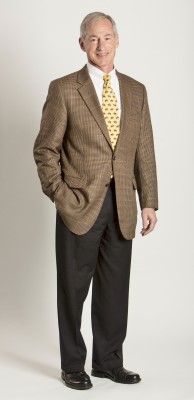Honored as one of Olin’s 2015 Distinguished Alumni, Dr. Steve Miller, is also a great friend and supporter of the business school community. This is the first in a series featuring “Friends of Olin” from the Office of Corporate Relations.
Dr. Steve Miller has served as Chief Medical Officer at Express Scripts since 2006, focusing on supporting government relations, leading the Pharmacy & Therapeutics committee, managing the Medical Affairs team and interfacing with client groups.

Steven Miller (EMBA 2002), is Senior Vice President and Chief Medical Officer of Express Scripts Holding Company.
©Photo by Jerry Naunheim Jr.
He received his medical degree from the University of Missouri-Kansas City, and he trained in the Pathology and Research fellowship at the University of Alabama at Birmingham, Internal Medicine at the University of Colorado, Nephrology at Washington University, and did a cardiology research fellowship at University of California-San Francisco. Miller earned his MBA at Olin.
Dr. Miller has presented the commencement address for EMBA Class 40 and Shanghai EMBA Class 11 in December of 2013 and worked with Alumni and Development so that Express Scripts could be a host for the 2014 Olin Alumni Reception. He continues to be involved in the success of Olin Business School.
He exemplifies a Friend of Olin. Friends are those who are giving of their time, their knowledge, share their years of experience, open the doors of their companies to students and faculty, helping Olin build better leaders.
What has been one of your most valuable experiences at Olin Business School?
SM: I benefited from every experience provided by the EMBA program. Probably the one that stands out the most was HR and Organizational Development taught by the legendary former head of HR at Monsanto, Robert Berra. His pragmatic approach to managing and developing people continues to influence me daily. Companies are really about their people and he took it past the talk and taught you how to execute.
What is the most compelling thing your mentor has shared with/done for you?
SM: Early in my career, I had a mentor who taught me “equanimity” and “imperturbability.” This is the quality of being calm even in the most difficult of situations. As a physician, this is really important as it promotes clarity of thoughts and reassurance to patients, their loved ones and healthcare colleagues. It has proven equally important in business as it promotes top performance from our teams.
What are the 3 biggest challenges facing leaders today?
SM: The top challenge continues to be about people. Finding, hiring, developing and retaining top talent is mission critical for any organization. Second in my mind is dealing with change, especially the speed of change. Not everyone embraces change but it is inevitable. The third big challenge is regulatory burden. While most all regulations are well intended, there are always unintended consequences. Finding the right balance is very difficult.
What is the one behavior or trait you have seen impede leaders’ careers?
SM: It always has to be about the mission and not about the person. If you put the mission first, the leader usually benefits also. When it becomes about the leader first then both fail.
Tell us about a pivotal moment in your career.
SM: Without sounding too solicitous, getting my MBA was the pivotal moment in my career. Healthcare is somewhat of a cottage industry. Top leaders are often given positions because they were the best clinicians or scientists. Unfortunately, as the field grew into one of the largest segments of our economy, those skills alone were inadequate to manage. It has often contributed to the slow progress we have made in how we provide care in this country. Combining an MBA with my medical degree, clinical and research experiences has allowed me to make a much bigger impact.
What are you grateful for today? Why?
SM: I am the most fortunate person I know. I have a spectacular wife/best friend, three amazing kids, great friends and family, a wonderful career of purpose and good health. What more could anyone desire?
Who’s your favorite business speaker or author? Why?
SM: My favorite business author/speaker is Dr. Bob Lefton of Psychological Associates here in St. Louis. I teach his Q4 model to everyone who works for me. It provides a framework for communication and behaviors that really helps to create high performing teams.



